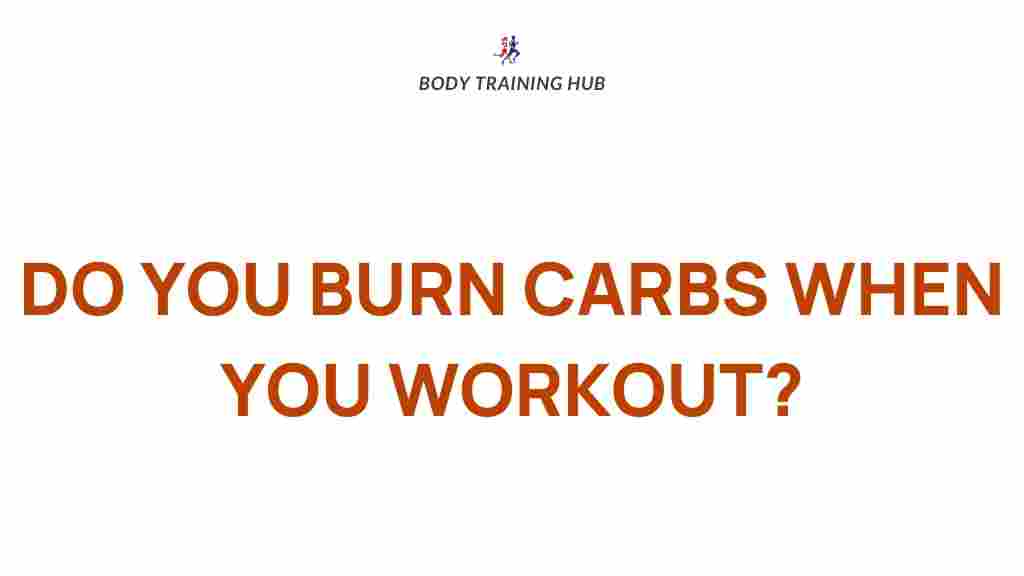Uncover the Truth: Do You Really Burn Carbs When You Workout?
When it comes to fitness and exercise, understanding how our bodies utilize energy is crucial. Many people strive to burn carbs during their workouts, hoping to enhance fat loss and improve overall fitness. However, the relationship between carbs, exercise, and metabolism is often misunderstood. In this article, we will explore the truth behind burning carbs during workouts and clarify some common myths surrounding exercise and energy use.
Understanding Carbohydrates and Energy
Carbohydrates are one of the three macronutrients, alongside proteins and fats, that provide energy to our bodies. They are stored in the muscles and liver as glycogen, which serves as a readily available energy source during physical activity. When you engage in different types of exercise, your body will prioritize using glycogen for fuel, especially during high-intensity workouts.
How Does Your Body Utilize Carbs During a Workout?
When you start a workout, your body begins to burn energy to sustain the activity. The type of fuel your body uses—carbs, fats, or proteins—depends on several factors, including:
- Intensity of Exercise: Higher intensity workouts, such as sprinting or heavy weightlifting, primarily use carbohydrates as their main fuel source.
- Duration of Exercise: For longer, steady-state cardio sessions, your body may gradually shift to burning more fat as glycogen stores deplete.
- Fitness Level: More conditioned athletes may burn fat more efficiently compared to beginners who may rely on carbs.
Myths vs. Facts About Carbs and Workouts
There are numerous myths surrounding the idea of burning carbs during workouts. Let’s separate fact from fiction:
- Myth 1: You can only burn carbs during cardio exercises.
- Fact: While cardio does burn carbs, strength training also utilizes glycogen, especially during intense lifts.
- Myth 2: Eating carbs before a workout means you’ll burn them off immediately.
- Fact: The body processes carbs over time, and they are used as fuel based on your workout’s intensity and duration.
- Myth 3: If you don’t burn carbs, you won’t lose weight.
- Fact: Weight loss depends on overall energy expenditure and balance, not solely on burning carbs during workouts.
The Role of Metabolism in Energy Usage
Your metabolism plays a pivotal role in how your body burns energy during exercise. Metabolism refers to all chemical processes that occur in the body to maintain life, including converting food into energy. It can be influenced by:
- Age: Metabolic rate generally slows down with age.
- Muscle Mass: More muscle means a higher resting metabolic rate, which can help burn more calories—even at rest.
- Activity Level: Regular exercise can boost metabolism and improve how efficiently you burn carbs.
How to Optimize Your Workouts for Carb Burning
If your goal is to burn carbs effectively during exercise, consider the following strategies:
- Incorporate High-Intensity Interval Training (HIIT): Short bursts of intense activity followed by rest can lead to increased glycogen usage.
- Weight Training: Lifting weights not only builds muscle but also uses glycogen stores, helping to burn carbs efficiently.
- Stay Hydrated: Proper hydration supports metabolic processes and can enhance workout performance.
- Fuel Properly: Eating a balanced diet with adequate carbohydrates before and after workouts can help maintain energy levels.
Common Troubleshooting Tips
If you find that you’re not burning carbs as anticipated during your workouts, consider the following troubleshooting tips:
- Evaluate Your Nutrition: Ensure you’re consuming enough carbs to fuel your workouts. A low-carb diet may hinder your performance.
- Monitor Workout Intensity: If your workouts are too easy, try increasing intensity to engage more glycogen stores.
- Rest and Recovery: Insufficient recovery can lead to fatigue and decreased performance, impacting your ability to burn carbs effectively.
Conclusion: The Truth About Burning Carbs During Workouts
In summary, understanding how your body utilizes carbs during workouts is essential for optimizing your fitness routine. While it’s true that carbohydrates are a primary fuel source for exercise, the specifics of energy burning depend on various factors such as workout intensity, duration, and individual metabolism. By debunking common myths and following effective strategies, you can make the most of your workouts and enhance your fitness journey.
Remember, a balanced approach to nutrition and exercise is key. If you’re interested in learning more about fitness and energy use, feel free to check out this resource. For more tips on optimizing your workout routine, visit our fitness blog for additional insights!
This article is in the category Myths & Facts and created by BodyTraining Team
